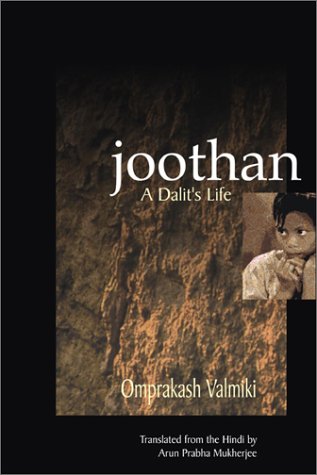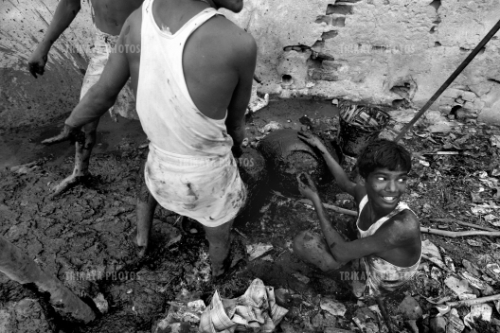“Why is my caste my only identity?” – Omprakash Valmiki, Joothan.
 ‘Dalit’ was not a word that belonged to my vocabulary. The word ‘untouchable’ hovered as a vague ghostly embodiment on the edges of my consciousness, but Dalit was an unknown foreign object that waited just out of reach. I had to only reach out and pluck it. Luckily, in the fall of 2005, Dr. Arun Mukherjee introduced me to Omprakash Valmiki’s Joothan in her second year “Post Colonial South Asian Literature” class.
‘Dalit’ was not a word that belonged to my vocabulary. The word ‘untouchable’ hovered as a vague ghostly embodiment on the edges of my consciousness, but Dalit was an unknown foreign object that waited just out of reach. I had to only reach out and pluck it. Luckily, in the fall of 2005, Dr. Arun Mukherjee introduced me to Omprakash Valmiki’s Joothan in her second year “Post Colonial South Asian Literature” class.
Dalit is a term that was readily adopted by the untouchable communities all over India. As a translator of Joothan from its original Hindi to its English form, Mukherjee writes in the introduction that “this was the first time that [the untouchables] had been able to name themselves, as a collectivity, rather than be named by others”.
Among these “other” names, one that most springs to mind is Gandhi’s ‘Harijan’. A loose term for ‘Children of God’, Gandhi allowed for further segregation of the Dalit community rather than an integration into the mainstream. Kind of ironic, if you think about it. I wonder if he stopped to think of his foolish mistake. Even today, people from the higher castes (or, anti-Dalits, as Mukherjee puts it) use the term ‘Harijan’ to insult and taunt.
I remember Ma telling me about Gopal. When she was a little girl living in the city of Calcutta, almost half a century ago when proper disposal of excreta had not even come into existence. When you apparently shat into a huge earthen pot that was later emptied out by the sweeper, a designated untouchable. In my mother’s childhood days, Gopal was this sweeper.

The boy cleaning his basket and vessels, after he finished his work. India, 2007. Copyright Senthil Kumaran / Trikaya Photos.
He was known as a mathor, meaning a guy who was responsible for cleaning people’s excreta (and who cleaned his?). He was literally an untouchable as everyone gave him a wide berth. Sure, he was invited to weddings, but he always had to sit far apart from the other wedding guests.
A recent article in Deccan Herald that sparked me to write this blog post pointed at a demeaning incident where as a way to protest injustice and to get their voices heard, members of the Dalit community were forced to smear human excreta on themselves. In the town of Savanur (in the Haveri distict of the Karnataka state in India), the Dalit community were evicted from their homes by Savanur Town Municipal Council (TMC). In a world where greed wins over humanity and commercialism rules in the face of poverty, the TMC decided that their land would be better off if used for a commercial complex rather than as the homes of the many poor Dalit workers who have been residing there for the past seventy years.
These Dalit workers and their families belonging to the Bhangi community (which is also treated as the lowest among the Dalit community) were first given verbal directives by the TMC, which later accelerated to cutting off of water supply, dumping garbage in front of their houses, and insulting and threatening their women. Frustrated, these workers were forced to extreme measures that included a march to the TMC office on Tuesday July 20th, and pouring human excreta over themselves as a way to protest their continued humiliation.
Result? The TMC Executive Officer H.N. Bajakkanavar defended TMC and said that they had assured to provide houses under various housing schemes. He also explained that the water supply was cut off because it was illegal. Irony again, as Dalit Sangharsha Samiti activists testify that there are other illegal water supplies in town that are still in existence.
As Valmiki writes in his book Joothan, “Because in their eyes, I am only an SC (schedule caste), the one who stands outside the door”. Thus, even though the Dalit community constitutes 16% of the Indian population, they are still left standing outside the door of humanity.

